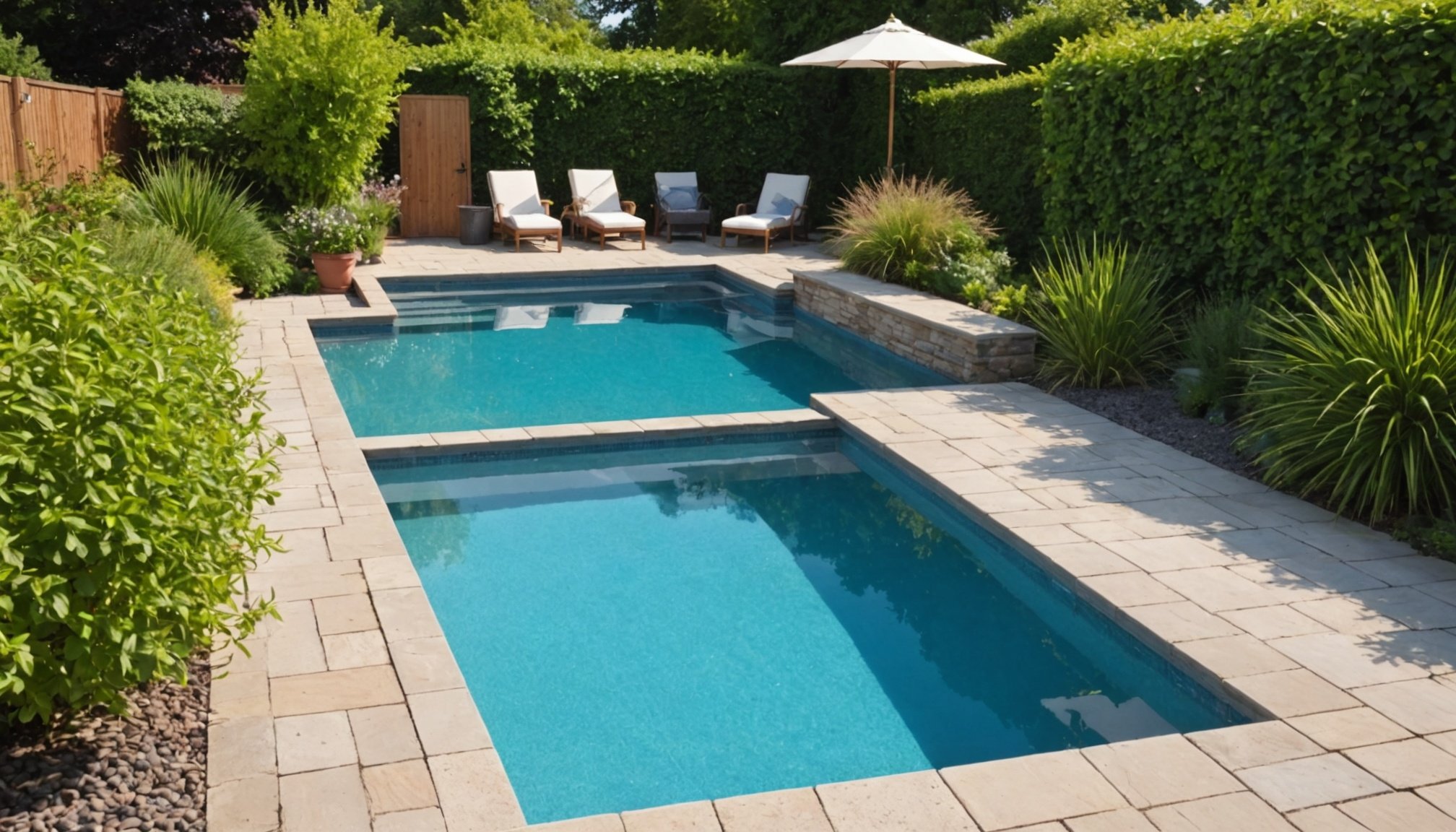Overview of Eco-Friendly Pool Drainage Solutions
Adopting eco-friendly drainage practices for swimming pools is vital in minimizing environmental impact. Traditional methods often lead to water wastage and potential harm to local ecosystems. Embracing sustainable practices ensures that pool water management is both environmentally responsible and efficient.
One common challenge UK homeowners face is navigating the myriad options for pool water management. Factors such as local regulations, water quality, and climate conditions can complicate decisions. Fortunately, a range of innovative solutions is available to address these concerns, promoting a more sustainable approach.
A découvrir également : Mastering Mood Lighting: Transform Your UK Swimming Pool with Color LED Lights
Innovative Methods
-
Rainwater Harvesting: This technique not only conserves water by collecting rainwater for pool use but also reduces dependency on municipal water supplies.
-
Natural Filtration Systems: Employing plants and biological processes to clean pool water is an effective way to maintain a chemical-free environment, benefiting both the pool users and surrounding flora and fauna.
Avez-vous vu cela : 10 Smart Ways to Boost Energy Efficiency for Your UK Home Swimming Pool
-
Variable Speed Pumps: These devices optimize energy use, adjusting to the pool’s specific needs and thus reducing overall power consumption.
Incorporating such eco-friendly drainage methods aids in responsible water management and fosters a more sustainable future for pool owners. Adjusting your approach not only meets environmental goals but also often results in long-term cost savings.
Understanding Local Regulations and Compliance
Navigating UK pool drainage regulations is essential for maintaining both environmental responsibility and legal compliance. Local authorities set specific compliance guidelines that pool owners must follow to ensure that wastewater does not damage ecosystems or infrastructure. These regulations can vary depending on the area’s specific characteristics and environmental conditions, making local authority policies crucial.
Compliance with these guidelines is more than just following the law—it is an integral part of eco-friendly practices that safeguard local habitats. By adhering to these regulations, homeowners contribute to a broader effort to protect natural resources and public health, fostering a safer and more sustainable environment.
Homeowners seeking to ensure compliance have several resources at their disposal. Local environmental departments provide detailed guidance on the steps needed to meet regulatory standards. Additionally, engaging with professionals who specialize in sustainable pool maintenance can offer insights into best practices for drainage. Consulting with community forums or professional groups dedicated to pool management may provide valuable advice and shared experiences, offering practical solutions to common compliance challenges.
Understanding and implementing these regulations not only keeps you on the right side of the law but also demonstrates a commitment to environmental stewardship and community wellbeing.
Innovative Technologies for Managing Pool Drainage
In the ever-evolving world of pool management, staying ahead with technology is key. Our focus is on smart drainage systems that offer sustainable solutions.
Smart Drainage Solutions
First, let’s explore how these systems function to enhance efficiency and reduce waste. Innovative pool solutions leverage sensors to monitor water levels, automatically redirecting excess water to storage or garden areas. This integration not only maintains pool capacity but also minimises environmental impact.
Rainwater Harvesting Systems
A noteworthy approach is the use of rainwater harvesting in pool management. This method captures and stores rainwater, repurposing it for pool use. As a result, it conserves water and reduces reliance on municipal supplies. The benefits extend beyond sustainability, offering cost savings and eco-friendly application.
Pump and Filter Systems
Lastly, pumps and filters play a crucial role in sustainable drainage. Advanced systems are designed to circulate water efficiently, decreasing energy consumption while ensuring clean, well-filtered water. These technologies represent a commitment to innovation and sustainability, providing a framework for responsible pool maintenance.
Maintenance Tips for Eco-Friendly Pool Drainage Systems
Regular pool maintenance is essential to ensure the efficient and sustainable operation of your eco-friendly pool drainage system. By adopting sustainable upkeep methods, you not only extend the lifespan of your system but also minimise environmental impact.
Firstly, conduct routine checks. Inspections should focus on identifying clogs, leaks, or any blockages that might impede system performance. Promptly addressing these issues ensures smooth functioning.
Incorporating eco-friendly practices begins with your cleaning regimen. Use biodegradable cleaning products specifically designed for pool systems. These products are effective yet gentle on the environment, helping to maintain water quality without introducing harmful chemicals.
Inspect each component regularly. Pay particular attention to filters and pumps as these are critical for keeping the system efficient. Replace worn-out parts with eco-friendly alternatives when possible. Maintaining regularly ensures your system runs efficiently and reduces energy consumption.
Consider the use of natural pool covers to reduce water evaporation and keep debris out, which can decrease the workload on your system. By integrating these sustainable upkeep techniques, you contribute to a healthier environment and improve your pool’s operational efficiency.
Adopting these practices can significantly benefit both the environment and your pool’s longevity.
Cost-Effectiveness of Eco-Friendly Solutions
When examining the value of sustainability in eco-friendly solutions, the balance between initial investment and long-term savings becomes a focal point. An important factor in the cost analysis is that while the upfront financial commitment can be significant, eco-friendly home modifications often lead to long-term financial benefits. Over time, these solutions can reduce energy consumption, thereby lowering utility bills.
Sustainable practices, such as installing solar panels or energy-efficient windows, may appear costly initially. However, they frequently pay off over a period, offering substantial savings on expenses like heating, cooling, and electricity.
Moreover, investing in eco-friendly renovations isn’t solely a personal financial decision. Various funding and grants are available to homeowners seeking to embrace sustainability. Government incentives and subsidies often alleviate the financial burden of these initial investments, making them more accessible.
Ultimately, the long-term savings associated with sustainable practices underscore their cost effectiveness. By implementing eco-friendly solutions, individuals not only reduce their carbon footprint but also pursue a financially viable path. Those considering such modifications should research applicable grants, optimizing the financial benefits while contributing positively to environmental sustainability.
Case Studies and Success Stories
Examining real-life examples provides valuable insights into innovative drainage system solutions. Homeowners have benefitted significantly from these successful implementations, showcasing both creativity and practicality in their approaches.
Case Study 1: Innovative Drainage System Implementation
One notable case is an urban homeowner who designed an innovative drainage system to manage their pool water more sustainably. They utilized a series of underground piping and rain gardens, transforming excess water into a resource for landscaping. This system not only reduced water wastage but also enhanced the garden’s aesthetics, proving that eco-friendly practices can merge functionality with beauty.
Case Study 2: Cost Savings from Sustainable Practices
A suburban couple showed how small changes result in substantial savings. By integrating smart irrigation controllers and sustainable practices, they reduced their annual water bill by 30%. Their story highlights the economic benefits that accompany eco-conscious living while emphasizing long-term financial gains.
Case Study 3: Overcoming Regulatory Challenges
Navigating environmental regulations often poses a challenge. One community tackled regulatory challenges by consulting with local authorities to implement a drainage plan that met both ecological standards and legal requirements. Their story illustrates the importance of collaboration and innovation when aiming for successful implementations in eco-friendly drainage.
Expert Opinions and Recommendations
In the realm of pool management, expert advice plays a pivotal role in ensuring effective and eco-friendly practices. Professional insights from seasoned experts often reveal the best practices for pool maintenance, such as maintaining balanced chemical levels and implementing energy-saving techniques. Listening to these insights can help avoid common pitfalls and lead to more efficient pool operations.
Testimonials from industry professionals underscore the importance of using high-quality products and services when it comes to eco-friendly drainage solutions. These recommendations not only aid in reducing environmental impact but also enhance overall pool performance. For instance, opting for biodegradable chemicals or energy-efficient pumps can significantly lower a pool’s carbon footprint while also cutting down on long-term costs.
Securing expert consultation is crucial for developing tailored solutions that meet the unique needs of your pool. Professionals can assess specific environmental considerations and usage patterns to formulate a custom strategy that maximizes efficiency and sustainability. Their professional insights ensure that you’re not just following generic guidelines but are equipped with a bespoke plan adapted to your specific situation.
By combining expert guidance with practical solutions, pool owners can confidently manage their pools while contributing positively to environmental sustainability.











